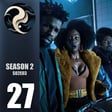Become a Creator today!Start creating today - Share your story with the world!
Start for free
00:00:00
00:00:01

Episode 032 - The Comfort of Strangeness Part 2
In this episode we continue our discussion on the cinema of the strange discussing some of our favourite absurd and surreal films.
Intro clip from John Boorman's "Zardoz" from John Boorman Productions Ltd and distributed by 20th Fox and Fox-Rank Distributors
Opening music: https://pixabay.com/music/id-116199/
Closing music: https://pixabay.com/music/id-11176/
Two Oceans is a creation of Siouxfire & Scrumpy in association with SiouxWIRE
Recommended
Transcript
Introduction to Two Oceans Podcast
00:00:08
Speaker
Oh yeah, pretty pretty. It all seems... Two oceans will begin. Zardoz speaks to you. His chosen ones.
00:00:35
Speaker
You have been raised up from brutality to kill the brutal sumultiply and our legion. This end, Zadar's your god, gave you the gift of the god.
00:00:56
Speaker
The gun is good. The gun is good. The penis is evil.
Exploring Absurd and Surreal Cinema
00:01:07
Speaker
Welcome to the Two Oceans Podcast, where myself, Sue Fire, along with my friend and astonishing colleague Scrumpy discuss film and other media through a decades-long lens of mass media consumption. In this episode, we continue our look at the cinema this strange, covering the absurd and the surreal. This is the Two Oceans Podcast, so open the umbrella, put in the ear pods, turn right, and go into the janitor's closet as we begin Episode 8, Series 2.
00:01:39
Speaker
Episode two, The Comfort of Strangeness. Our list was too huge to fit into a single episode. In fact, probably going to need round four.
Analyzing 'After Hours'
00:01:47
Speaker
Go into the States again with Martin Fazzy's 1985's After Hours. Yay! The first, but not the last, Kafkaesque movie that we have on the list.
00:01:59
Speaker
Indeed, yeah. After Hours is great. Love that one. Love that period for Scorsese's output where he did stuff that was just like, huh? He wasn't afraid to go, huh? King of comedy falls into this as well and the time frame.
00:02:15
Speaker
right around with Raging Bull as well. You know, it's just like this amazing grid and then New York, New York, which isn't good, but they can all be winners, but it is a great time for that. And after hours is so good. Griffin Dunn is just so good in this. Yeah. I mean, he's great across the board, right? Wherever he pops up, but this one's really, really seeing that it's another one of those fitting the confines of a signal evenings, events, you know, for another.
00:02:38
Speaker
other sub genre that it's part of, but it's just so beautifully weird and leans into the New Yorkness of it, but in a way that's not alienating or exploitation. Well, that's the whole thing that we talked in the last episode about the atmosphere in a lot of these movies that kind of
00:02:55
Speaker
carry them over into weird. And this movie almost feels claustrophobic in New York City. It's got that eerie, kind of desolate atmosphere of New York City. It's almost entirely at night, which kind of augments all that sort of isolation for Griffin Dunn, you know? And it's, yeah, it's quite something.
New York's Transformation
00:03:15
Speaker
Yeah. This is New York that I grew up idolizing. The pre-Juliani Seinfeld cleaned up in New York. Oh, it was not clean when I lived there.
00:03:26
Speaker
No. No. In fact, the poor bit of town that I lived in is now all been gentrified. Of course. The race are all ridiculous, which is crazy to think that people will be paying for those small spaces like they do now.
00:03:43
Speaker
But yeah, I'd had that kind of, what was that other movie of the time that could probably fit into the strange list as well, The Warriors. You know, I'm going through Central Park at night. It had that weird, gritty atmosphere that I really miss in movies. You don't tend to see them in modern films anymore. That sort of grittiness, that sort of dirty feel. Seeing the grain of the film in the dark as well kind of adds to it.
00:04:13
Speaker
Yeah, great
'Leonor Will Never Die' Tribute to 80s Action
00:04:14
Speaker
movie. And then next we go to the Philippines for Artica Ramirez Escobar's 2022 Leonor Will Never Die. Yes, which is just a joy of a movie.
00:04:27
Speaker
And another one that's a love letter to a genre of movie. I mean, surprisingly so. It feels like, yeah, it feels like it comes out of nowhere kind of to me, you know, coming out from the Western for Filipino audiences, probably not at all. You know, right, right. But, you know, and this is in the best possible revelatory kind of way, you know, for being a screen a screen reformer screenwriter that's trying to do it again. Yeah.
00:04:57
Speaker
I mean, it's another one where the lines between reality and fiction get blurred, and there's a few on this list where, I mean, there's a segment in it that is quite video-drome-y with the television, and that's how it starts as well, getting hit in the head by a television. But there are things that you recognize as well, because when they're talking about it being an homage to the action films of the 1980s in the Philippines,
00:05:25
Speaker
So, those took inspiration from Western movies. Oh, yes. Oh, very much so, yes. Yeah, you can definitely see that texture in it as well. But yeah, it's a lot of fun. Another thing that we don't get in the West is there tends to be this tendency that leads need to look a particular way.
00:05:50
Speaker
And, you know, you have this sort of middle-aged older Filipino woman is the lead in this, Leonor. And that in and of itself is different to what's usually sort of pushed out there. I mean, it's getting better. It's getting better.
00:06:06
Speaker
Yeah agreed, but yeah, and it's and it's also sweet and endearing and and you know and a lot more honest And yeah, it just has so many things going for you. Just like it's not what you'd expect at all It's just it's a fun time. Yeah. Yeah. Yeah. Yeah, it's not really good The emotions definitely resonate that movie and it's it does click it is convincing. Yeah
The Quirkiness of 'Swiss Army Man'
00:06:31
Speaker
Next on the list, we have 2016 Swiss Army Man from the Daniels, who went on to do everything everywhere all at once, which, have you seen it for a start? Swiss Army Man? No. Oh, this is definitely worth seeing. I don't think it sticks the landing, but the majority of the movie is so
00:06:55
Speaker
enjoyable. Daniel Radcliffe has such a great performance in it. Paul Danno as well. It's pretty much a double act between them. And it really does push the envelope in terms of grossness because essentially Daniel Radcliffe's a dead body that washes up and shore. Paul Danno's stranded on this remote island or somewhere in the wilderness and he keeps the body to keep him company. I mean,
00:07:24
Speaker
And then he finds all kinds of uses. But again, it's blurring the lines between reality and fiction and dream. And you don't know what, you know, is this really happening kind of thing? But it's such a bizarre premise and it's done so well up until the end bit. The end bit irks me a bit. If you wonder once you've seen it, we can have a conversation about it.
00:07:50
Speaker
But the majority of the movie is almost joyous. I didn't like the direction it went in. It's probably not even the last quarter. It's probably the last 10% where I felt it didn't quite work.
00:08:08
Speaker
Moving on from that, we have 1978's Attack of the Killer Tomatoes from John DiBello, which again is another one of these movies that we would have been introduced to by Cable and the Video Shop. Yes, indeed. Yeah, it was just the premise as well leaning into that, you know.
00:08:29
Speaker
Same with something like Killer Clowns from Outer Space or something like that. Lean in, hell comes to Frogtown. You know, leans right in, knows what it's doing, understands the assignment, leans right in. You know, is it good? Arguable. But again, in the read, you know, again, man's read should exceed his grasp, else what's a heaven for?
00:08:56
Speaker
Yeah, I remember thinking like, oh, well, it'd be curious how they do that. I'm like, okay, that's how they tried to do that.
00:09:01
Speaker
You know, and a lot of these are, you know, and it's part of, you know, it's very, again, speaking back to the Corman thing, it's very much that thing. It's like, hey, here's a, you know, you know, from the title what you're going to get. And, you know, and that will sell, you know, you'll sell it on that alone. You know, that's. It's another one that's a parody, but also loving what it's parodying. So it's a parody of B-movies and it is totally a B-movie, you know, no doubt about it.
00:09:31
Speaker
The other thing is the theme song, which is called Puberty Love, was sung by Matt Cameron, who later on became the drummer for Soundgarden and Pearl Jam.
00:09:46
Speaker
Okay. Which is weird. And then it's Wanda franchise. And was it George Clooney, I believe was in the second. I think so. In the second one. Yeah, I think. Which apparently is even worse than the first one. Or I don't remember the second one or I move that from memory. Yeah. It's not on the list. It's not on the list. No. For good reason. And next on the list.
Edgar Wright's 'Barbarella' Remake?
00:10:08
Speaker
And this is just kind of another classic is Roger Vadim's 1968, Barbarella with Jane Fonda.
00:10:16
Speaker
Which, interestingly, looks like it's going to be getting a remake soon, as Edgar Wright is in talks to direct a new vision of that movie with Sidney Sweeney. Sidney Sweeney, yeah. So it's like, that could work. That could work. And I think Edgar Wright, it's a pretty good choice. Oh, that's a great choice. I wouldn't trust it too much anybody else. I know Robert Rodriguez was for years trying to get the name.
00:10:44
Speaker
No, no. And he just would not have been the right. No, I don't think that that would be a good match. I mean, I'm thinking in terms of Scott Pilgrim versus the world, that kind of momentum and tone in the movie would be good, especially if he retains the 60s kind of feel to it as well.
00:11:02
Speaker
which he's proven he can with Last Night in Soho. Oh, that's true. That's true. But yeah, again, I don't think this is a great movie. I think it's got iconic moments. Yeah, no, it's not a good movie. And I mean, it's adapted from a French comic book series as well. So yeah, two strikes against it already. Yeah.
00:11:25
Speaker
But the production design is really good in it. Yes. It's very striking. It's very memorable. Again, it did its job, right? Oh, totally. Totally. Delivered anything else. It got people butts in seats, and that's all they needed.
00:11:43
Speaker
I don't think they turned up for the costumes, I think. But next on the list is we were talking in the last episode about things that we saw when we're quite young as
Absurdity in 'Rhinoceros'
00:11:56
Speaker
kids. This is one I remember talking about in grade school, which was Tom Horgan's 1974 rhinoceros with Gene Wilder and Zero Mustel.
00:12:06
Speaker
And just thinking, what is this? And I remember it was on PBS when I watched it, and it just seemed like such a funny idea that I think it's probably one of the earliest films I'd seen that was completely surreal, where like, oh, people are turning into rhinoceroses. That's the idea that maybe
00:12:28
Speaker
And it's kind of a bleak ending as well. I don't want to give it away, but a completely absurdist movie that, you know, as a kid, you wouldn't kind of get like what it's trying to get at. You know, do you remember this movie? Not at all.
00:12:45
Speaker
Really? Really? I remember people talking about it in school and going like, you know, what was that? I don't know. It was almost like an extended Saturday Night Live sketch to me as a kid, it was. So Gene Wilder is in
00:13:08
Speaker
And I believe it's in Paris that it's sad. And his friend is here at Mostel. People in Paris just start turning into rhinoceroses until almost everyone's in rhinoceros. And it's kind of this conformity kind of going on is the idea behind it.
00:13:26
Speaker
It's worth checking out. I mean, I've got a soft spot for it because I saw it when I was quite small. It feels good to revisit these things and go like, oh, look at all these other layers I didn't see when I was a kid.
Ed Wood's Cult Classics
00:13:39
Speaker
Right. Going back a little further, we spoke about Edward before, but obviously 1959's Plan 9 from Outer Space with Belo, we're going to see Vampira and Tor Johnson.
00:13:52
Speaker
Yes, which for years carried the worst movie ever made, moniker. Yeah. I don't know if that's fair. No, it's not fair at all. Again, because of the things we talked about already with Ed Wood. He didn't think he was making bad movies. No, no, I think there's a sincerity in it and you can see it. There's a lot of humor going on. Tim Burton's Ed Wood, which is a lot about the production.
00:14:20
Speaker
of Plan 9 is an excellent companion reader piece to it, but once you see it, you're like, what the hell is going on? This is great, because it's just so like, hey, we can make a movie idea. And everybody seems sincere, but everybody seems miscast or perfectly cast.
00:14:41
Speaker
by the same stroke. And it's just got the things that have been so overplayed since then. A lot of stuff has been pulled from this. The imagery and things like that, that kind of thing. I think the snobbery that we talked about before was factoring into it. Oh, totally. Totally. In terms of the worst movie ever.
00:15:04
Speaker
This is so low, and this is just, yeah, it's just bass. It's like, no, this is not bass. I would rather, you know, I would rather have Ed Wood than Michael Bay. Oh, totally. 100%. Any day of the week. 100%. Yeah, yeah, yeah. That's exactly it is. That sincerity, you can see it on the screen. The effects aren't as good, but that kind of shows... Performances also, and you know, a few other things, but... Dialogue. Great.
00:15:32
Speaker
And the next one we got is Glenn or Glenda from him. Like I said, I watched that earlier. And I mean, in one, he shoehorned Bela Lugosi into that movie, like Bela Lugosi. Oh, totally. He idolized Bela and he wanted to find some way of getting him into this film. And I don't think that helped.
00:15:56
Speaker
Because this also was, for a while, voted as the worst movie ever. But it's 1953. He's talking about transvestites, and he's basically creating these treaties about being open and kind to people. People have done worse things than that. So, yeah. Well, yeah, there's also, I mean, it's also a confessorial. I mean, it's about him.
00:16:24
Speaker
Autographical, yeah, right? Yeah, and he's putting that out there. In fact, he felt confident enough. White guy confidence, I guess. But by the same stroke, it's like, yeah, where else could you do this? He's like, well, of course I'm going to make a movie about it. Someone else would make a play and it would probably be revered at the time or something versus a movie. This just seems
00:16:47
Speaker
And the way he knew he could sell it was just this grossly exploitation approach to it. It was like by whatever means, right? Whatever it takes. Isn't a million miles away from Corman? Exactly. Exactly. And basically, it's like there's nothing wrong with that. You got to do whatever you can, whatever you have to, to get it out there.
00:17:10
Speaker
Yeah, it's an interesting thing from that. Again, is it good? No, but is it worth watching? Absolutely. I think his intention is good. I think this is just because it is autobiographical that it does come across as being more sincere, but you're like...
00:17:31
Speaker
why, why, why the buffalo running and why, why is Bella shouting bullet strings? It's, you know, things like this are just weird and distracting from the movie because it surprised me. I was like, Oh, actually, I'm kind of getting into this. You know, I'm interested. I want to know more about this character. And then and he almost like shies away. It kind of goes to stock footage that he got of like go-go dancers and stuff. You know, it's like, OK, yeah.
00:18:00
Speaker
I think anyone who would want to see those go-go answers probably walked out by this point, Ed.
MST3K and 'Repo Man'
00:18:08
Speaker
Next on my list, and I think we covered this last episode, was Mystery Science Theater 3000 features and how important those were.
00:18:18
Speaker
either bringing up to the surface old films we'd seen or introduced us to things that we wouldn't have otherwise seen. Yeah, totally. Very much so. Yep. But the next proper... But also with the humor and everything like that too. Yeah. Yeah. And the humor was very good. Yeah. Let me just adjust the seat as we get into and chat. The next one, I think it's the first
00:18:42
Speaker
British one, which is Alex Cox's repo man from 1984. And Alex Cox used to have a show over here called Moviedrome, which every week pretty much did an underground movie of the week kind of thing. And he'd do this like 15 minute introduction to all these. And I think you can find quite a few of them on YouTube now. But he'd give these really sort of smart introductions to these movies and give you all the background and everything.
00:19:10
Speaker
kind of like what we are half-heartedly doing at the moment.
00:19:15
Speaker
But yeah, that was a big movie in the video shop. I remember it being quite hard to rent. Yeah, it was always out. Always out. But Repo Man for the soundtrack, it was just where it hit at the time. It was like that so many of the people that I knew were such two, it's just like it hit so well for us. And it was like, good that it's weird. That's a symbol that it's us.
00:19:40
Speaker
What, you had the pop, suicidal tendencies, black flag on the circle jerks. Yeah. The lounge band version of the circle jerks, you know. And the humor was deadpan in that. Oh, yeah. And you had that whole sort of undercurrent of like satirism of consumerism, American culture, British just love doing that, you know. I bet. Right.
00:20:06
Speaker
Now, the next one is one of yours, and I'm not seeing this one, which is Kinji Fukusaku's Black Lizard from 1968.
00:20:25
Speaker
It's a lot of things. Oh, it's a great title. It's a great... There's just a lot going on in that movie with cross-dressing as well as, you know, kind of the, you know, the rough cops trying to, you know...
00:20:40
Speaker
figure out the crime, but the way it's done and the way it's shot, it's just like stuff that now seems so standard or almost like, oh yeah, that's how all movies were in the sixties. Like, no, no, that's not how they all were. This was, this was really groundbreaking. It's just really
00:20:57
Speaker
all over the place, but in the best possible way. It's just a great little slice and one of those, again, like a lot of these, seems out of time. That it's like, really? You made this when? That's the wild thing about them, right? Which kind of goes back to how these movies were badly rated when they first came out because they were just too far ahead. Yeah.
00:21:22
Speaker
Right. So yeah, if you haven't seen it, I highly recommend it. It's absolutely a blast of just noir playing on, riffing on noir stuff, but being its own, but incorporating new elements, you know, like we've said with this, of some way to take in the genre and new directions or ones we haven't seen before that Black Loser definitely
Multiverse in Film
00:21:41
Speaker
does that.
00:21:41
Speaker
Well, I think Japan must be in the front now in terms of the competition between countries on this list by some origin. Next up is not as mainstream as you could get in terms of weird movies, but it's pretty amazing that this was the success it was, which is another entry from the Daniels from 2022, everything everywhere all at once. Yeah. Agreed. Yeah. Surprisingly popular. I think people were accustomed to the multi-first concept.
00:22:11
Speaker
And then this pushed it much further. I never would have thought the top movie would have had a scene where someone is just trying to sit on a dildo during a kung fu fight. And the fact that they, again, going back to Corbin, they did this on a tight budget as well. And they really do push the standards of narrative in the story as well.
00:22:40
Speaker
But it was a good story about mothers and daughters and generational trauma and relationship. They really sell that. And with primarily Asian actors, I mean, Jamie Lee Curtis is going to be an exception in there, but her character isn't meant to be central. She's just a good sideline supporting character. And Kei-Hoo Kwon just owning that. I mean, Michelle Kwon, of course, is great. Everybody's great in that.
00:23:06
Speaker
you know, some standout performances, people that just, they understood the assignment. And it's... Yeah. And stick in the landing. You talk about that just... And going back to the first one on our list of the happiness that kind of curries, again, is this creation of a convincing but flawed family, you know?
00:23:27
Speaker
Yeah, absolutely. Which is absolutely great. Which actually means that we've made it to the next category, which is the surreal. And what better way of kicking that one off than Louis Binuel's and Salvador Dali's 1929 classic, An Chien Andelou, which
00:23:48
Speaker
I mean, to this day, there are moments in this that still make me wince or still shock me. I think the eye-cutting scene- Slicing up eyeballs. Boy, that's not dated. That doesn't get easier to watch. No, that's well done. Yeah. Well done.
00:24:08
Speaker
Yeah, absolutely. And it's one of those things too where in terms of accessibility for the weird, for this sort of different sort of thing, you know, a lot of it will pop up and with Dolly's name in there, you know, he did the dream sequences for Not Suspicion, which one was it? The Hitchcock.
00:24:26
Speaker
Oh, Vertigo. Not Vertigo. No, earlier in that. One with Gregory Peck and that. Anyway, he did the dream sequences of that, which are central to the character being a psychiatrist and using, you know, dreams to inform and that sort of thing, too. And it's just, I think for a lot of people, it's like, oh, when it gets weird, it's a dream sequence. Like, it's just become so coded. Spellbound. Spellbound. There it is. Thank you. Yeah. Dolly did those dream sequences. And that's why it seems so, because you need
00:24:55
Speaker
something surreal, you know, again, has a basis in reality, but it's not reality, but it's a reality.
Surrealism in 'Holy Motors'
00:25:01
Speaker
Right. And so it's all meant to tie together. So the fact that, you know, this is right in the, especially for Dolly right in his prime, right. And I don't know, I don't think it's prime for Boone. Well, I think he didn't, you know, he kind of had a consistent arc of, of output that's pretty quality, but for what he was doing. But, you know, it's also then embracing the surreal,
00:25:23
Speaker
borderline with that where we're talking about the experimental because there's this movie in particular, it feels more like a student art film, right? It's really interesting that you mentioned that because just over a month ago, there was an article in The Guardian.
00:25:40
Speaker
about someone who for around $50 had bought all the handmade storyboards by Dolly for Spellbound. And yeah, it's only resurfaced recently. That's so strange. Well, there you go.
00:26:00
Speaker
And it is only 16 minutes as well. We do have some other shorts that are appearing in that list if we ever get through this. Next one is one of my personal favorites is Leos Carax's 2012 Holy Motors. And this is definitely one of those movies where you just have to let yourself go. And in fact, the movie has another one of those great openings where
00:26:22
Speaker
You have Elias in a room, very lynchy in a room, where there's a hole in the wallpaper, and when he looks through, he sees a cinema with rows of seats and whatnot, and you're just pulled in as the camera goes through the hole right into the screen that you see on the screen, and then that carries you through.
00:26:45
Speaker
And you can understand moments in the movie, these little vignettes that happen in it, and those make sense, but how it all connects together is a little bit more loose. And it is strange, but I felt like I went on such a journey with different moods and textures with every little bit.
00:27:08
Speaker
So, yeah. And again, it's another exploration of identity and performance. And there's a great musical number in it with Kylie Minogue. It's very touching about
00:27:20
Speaker
these two that reunite after being separated for a long time and it's like one of the most romantic scenes ever in the middle of this sort of chaos in this movie. But yeah, I love it. It's one of those ones where it got to the end and I didn't want it to end and I was too swept up in the whole thing to even sort of think about, you know, what does this mean?
00:27:41
Speaker
what does this happen? And I've never bored throughout it. It's definitely one that I think you need to see in a cinema, like on a big screen, at least for the first time. I think I'm not quite sure how it would work on television at home, because I think you need that kind of immersiveness if
00:27:58
Speaker
if you know what I mean. And next on the list for our surreal, strange movies, we mentioned it in the last episode was the Five Thousand Fingers of Dr. T from 1953 from Roy Royland with a screenplay from Dr. Seuss and Ellen Scott, who did Top Hat. And as you say, it sounds like a horror movie. And it is kind of a horror movie.
00:28:26
Speaker
For those who aren't familiar with it, it's musical fantasy. Very much feels like Dr. Seuss, but pulling Dr. Seuss into practical real-life effects is unnerving, you know?
00:28:43
Speaker
And it is very menacing, you know, the movie. It's trying to think what it would be like. I mean, I think Tim Burton was probably influenced by some of the production design in this movie, for sure. But I don't think Tim Burton, everyone as dark as this movie did, basically with enslaved children. It's one of those traumatic things like the child catcher.
00:29:10
Speaker
It's just one of those things that stuck with me as a kid. Why do I have this in my memory? I don't even want to see it. But visually, it's stunning, not for children, but certainly fits on this list.
00:29:27
Speaker
Other things I was going to mention are the short films David Lynch, and what I didn't realize recently is Valerian Brozic also made short films as well, which I've watched in the last week.
00:29:45
Speaker
And they're all kind of in the same vein as like the Brothers K and some of the Czech, you know, animators. And all these, those films, I mean, these are easy to, I mean, they're not easy to watch, but they're short, right? Like you can just pay attention for 10 minutes and just let yourself go through it. It's good practice for some of these longer movies, I suppose.
00:30:12
Speaker
And then we've got Roy Anderson's pigeon sat on a branch reflecting on existence 2014. And it could be any Roy Anderson movie I would highlight would fit on this list. So again, he's another director that creates these sort of feature length, can't even call them stories because it goes from like vignette to vignette.
00:30:36
Speaker
But he's got this weird deadpan. And I believe, trying to remember which one this is, is that when it opens up, you know, you have these static shots. There's lots of static shots. And Roy Anderson had that kind of look that we are probably more familiar with Wes Anderson now and associate with him. Roy Anderson was doing that a decade at least before Wes Anderson did that. These sort of static set up shots. And this movie sort of opens up with
00:31:06
Speaker
old fella with a walker, old woman, and there's like this tether. But then being dragged onto the screen is this dog who's just stopped walking and is just letting this old woman, and he spends like five minutes, it takes her to cross the screen, dragging the dog across. Dog seems fine, but it's just not walking. But yeah, mostly the humor isn't quite that on point.
00:31:33
Speaker
But I always feel like I've been somewhere after watching one of his movies. And next up, talked a little bit about this in the last one, is Louis B. Newell's 1972, The Discrete Charm of the bourgeoisie. Yes, yeah. Just in terms of, you know, good, incredibly solid example of
00:31:57
Speaker
the surrealist approach to filmmaking for feature- Yeah. Link stuff, yeah. And, you know, Boonwell being so political as well was, you know, it has a lot of layers. There's a lot going on in this one. It's got a lot of layers. I mean, like doing the research on this, I found layers that I wasn't even aware of. Like, apparently the film is full of animal symbolism.
00:32:22
Speaker
Okay. Throughout it. So there's like a reoccurring horse that appears in it, adding these sort of symbolic layers on top of this crazy dream within a dream within a dream narrative. But it, I mean, it's, it's, I mean, it's crazy to think that this movie was made in 1972. Right. It's, it's, it's, it's way, I don't think anyone's topped it.
00:32:45
Speaker
I know. Nothing like this. And the performances are really great as well. And it's one of the weird films because there aren't many movies that are released onto 4K. This is one of the few sort of art house movies that have been released on 4K over here.
00:33:02
Speaker
And that's how I rewatched it recently. And it looks great. I mean, it's good. Man, it's something else. But who knows what the rhyme and reason is of how they do these physical releases because it's really strange. But yeah, beautiful print. Definitely worth seeking out.
00:33:22
Speaker
Next on the list is Vera Chitilova's 1966 Daisies, and this has no story. I don't know if you've seen it. This is another one of those. And again, there's a bunch of vignettes. Do you know what I mean? I mean, it was part of the Czechoslovak new wave. Check new wave in the early 60s, yep. Basically a year and a half.
00:33:47
Speaker
to make films that were not Boy Loves Tractor films. And they made some stupendous movies. There are some animation, just off the chart. Yeah. Yeah. Shop on Main Street, Boxer and Death. I think there's just, there are so many they did that are so good at the time. And then they got invaded.
00:34:10
Speaker
Well, then they cracked down on it, and he's like, no more of that. But they had this brief little window that was this, and they just went for it. And boy, howdy, did they. Daisy is the outlier for it in terms of how far they went, right? No other film is like that at the time. The others are all pretty, at least more standard with their narrative approach or such too, even if they are a lot more experimental.
00:34:34
Speaker
Well, the reason that it ended was as so this was made 1966 in 1968, the Russians came in. Yeah. And as you know, if you've if you watched our romance episode, one of the films was in barefoot lightness of being that that was that has that event happening in it. And it was this whole thing about the Czech authorities thought the Russians would be fine. They were trying to do this thing of socialism with a human face, which which didn't go down well with
00:35:03
Speaker
the Russian authorities. They didn't want that. It was too strict enough, I suppose, and too close to Western values of this open-mindedness and avant-garde-ness. And I'm sure these movies probably wrangled some people as well. But it's another one. It's just so colorful as well, that this movie daisies. It's visually amazing.
00:35:29
Speaker
It's quite feminist, I think. Yes. Very much so. Yeah. And again, you're kind of going like 1966, really? Wow. Okay. Yeah. Uh-huh. And we're staying experimentally here, but a little bit closer to home. Godfrey Regio's Catsey trilogy, which started in 1982 and finished in 2002.
'Shin Godzilla' and Bureaucracy Satire
00:35:50
Speaker
with a great soundtrack from Philip Glass. And for those who aren't familiar with this, I think we've grown up with this series of movies. He's taken this footage of cities and traffic circulating.
00:36:06
Speaker
And, you know, you sped them up, so it's sort of time lapsed, but you start noticing the kind of patterns and how organic things look, like the freeways look like veins with blood flowing through them instead of cars and lights kind of blur together. I mean, it really does make you think. It makes you look at the world in a different way, which is, you know, one of those magic things that cinema can do. Indeed. Yeah, very much so.
00:36:36
Speaker
The next one on the list, boy, God, we take some 90-degree turns on this list, is Hideaki Anno's Shin Godzilla from 2016. So the reason that I put this on this list is I think this is a really bizarre movie. And I think the closest that it reminds me of any other sort of movie is a movie called The Death of Stalin, which follows the death of Stalin in his comedies.
00:37:05
Speaker
all the followers are scrambling over each other to try to jockey for position going forward. But Shin Godzilla is, and again, this is what happens in the best Godzilla movies, it's not about Godzilla. Godzilla is like
00:37:21
Speaker
the catastrophe. And most of this movie is about how the authorities react to that catastrophe and how completely hopeless they are. And I think it sort of laid the groundwork for that sort of ironically, there's our next evolution of Godzilla, which was Godzilla minus one. Yeah, right. Yeah, agreed. And that goofy googly eyed monster.
00:37:49
Speaker
It's really goofy. But the whole thing is about... But it is unpredictable at the start. You didn't know what was going to happen. It's like, is that Godzilla? It can't be Godzilla. What? What's going on? Is that who Godzilla's going to fight? And then you eventually kind of clock on that it's about government bureaucracy, which is crazy. But it's also how it works best when you use Godzilla as this force. Yeah.
00:38:19
Speaker
But the next one on the list is going back to 1974 from John Borman is Zardoz.
Surrealism and Themes in 'Zardoz'
00:38:29
Speaker
And this is another one that used to be on cable television all the time. It's just a bizarre, bizarre movie. And this is definitely surreal because I think the individual characters don't really matter much.
00:38:46
Speaker
It's about generalizations and the best you can do is that this group of people represents this, and this group of people represents this. It's such a deeply bizarre movie. And John Borman, we talked about Scorsese having this amazing time. I think this is probably the weakest of the movies that he made during this time, but he also went on to deliverance before.
00:39:10
Speaker
And then he did Excalibur afterwards, you know. So, you know, he was, which are all completely different movies. Exactly. And Zardas is Sean Connery's costume. That's the costume, yeah. Which I think made an appearance toward the latter end of the Venture Brothers series as well.
00:39:35
Speaker
And the head, yeah. But yeah, very, very bizarre movie. Next one, going a bit more recent, is from Peter Strickland, 2018's In Fabric. In fact, any of Peter Strickland's movies, Burberry and Sand Studio, could be on here. But this one is really, really weird. It's like a British giallo movie.
00:40:02
Speaker
Taking the idea that you have, I mean, the in-fabric idea is one from the guy that wrote Hellraiser, Clyde Barker, wrote a story about there being evil inside of the fabric. Killer dress. Yeah, the killer dress. I went to this movie blind and did not know what to expect. I mean, the narrative format is
00:40:30
Speaker
just nuts in this movie. Yes. But in the end, it does kind of tie everything up nicely. It does, actually. Yeah. Yeah. Surprisingly so. Yeah. It comes together as almost like a like the vignettish, you know, tales from the crypt. Right. I was just about to say it does feel like we talked about some movies that are like full length Twilight Zone episodes. Just not quite that conventional. Not quite that. Yeah. Tales from the crypt is probably a better, better comparison there.
00:41:00
Speaker
And then we've got 1973's René Laloux's Fantastic Planet, which was another one that was hard to get into when I was younger.
Animation and Politics in 'Fantastic Planet'
00:41:11
Speaker
It's made more sense to me as I've rewatched it, as I've got older.
00:41:16
Speaker
And I've heard now, gosh, let me just have a check here. I thought I've heard recently that someone wants to remake this, which I think is a terrible idea. I think part of its appeal is the kind of weird disconcerting animation in it, like unblinking aliens.
00:41:38
Speaker
Agreed. Yeah, there's something about it. And it also has all these sort of undertones about fascism and control, and there's all this politics in there, struggle for freedom,
00:41:58
Speaker
I mean, it's a really amazing movie. I'd love to see it in the big screen. I've only seen it at home, but I've been waiting for the day for some cinema to be playing this because that would be a great one. Next on the list, our first Jodorowsky.
Jodorowsky's Cinematic Style
00:42:13
Speaker
Probably his most accessible is Santa Sangre.
00:42:17
Speaker
1989. And it's another one, kind of like in fabric, that when you're watching it, you're thinking, this ain't making no sense. And then at the end, it kind of ties everything up. It manages to do so, yeah, agreed. Which is surprising for a Jodorowsky movie.
00:42:38
Speaker
Yes, it is. He leaves you more comfortable than getting there, certainly, than his other films do. This is another one that I remember seeing in your video rental shops all the time because I had quite a striking cover
00:43:00
Speaker
sort of hand-painted weird montage on top of it. And it's kind of weird to think that out of all of Jodorowsky's movies, the one that had circus performers in it is the one that feels the most grounded. But the writers on it is really interesting because you got Jodorowsky
00:43:19
Speaker
You've got, also you got an Argento and a Leone involved in it as well. And I think that's probably where the cohesion came in, is Jodorowsky was working in partnership with other people. But Jodorowsky, Leone and Argento, that's crazy to see those three names. It's almost like a Mount Rushmore of, you know.
00:43:45
Speaker
genre directors of the time. And 1976, we go to now with Nicholas Rogues, The Man Who Fell to Earth, which is very similar to Under the Skin, which we talked about a bit earlier. And yeah, this is another one where it's all very metaphorical, right? And there isn't much of a narrative thread that people are sort of accustomed to.
00:44:12
Speaker
with David Bowie's character who is unapologetically alien. We do see what's underneath the skin at a point in this movie, but somehow it's mesmerizing. It's typical of Nicholas Rogue as well. It's got that same pacing of things like Walkabout, where you're like,
00:44:36
Speaker
Where is this going? Don't try to figure it out. Just experience it. Don't try to anticipate this to go.
00:44:45
Speaker
Yeah, next on my list is one that I mentioned way back, I think, in one of our earlier episodes, which is Cristobal León's The Wolf House, which is a kind of stop motion animation from Chile.
Exploring 'The Wolf House'
00:45:00
Speaker
It is inspired by a true story of this colonel who had this secretive cult
00:45:10
Speaker
led by this German Nazi fugitive in Chile. And it's kind of talking about indoctrination, abuse. It's a heavy movie. Everything's kind of done sort of metaphorical with like
00:45:27
Speaker
wolves as the Nazis and all this. It gets into your skin in that way that Mad God does. It's that kind of animation. So it's definitely not something to relax. And it's not one that I'd go like, ah, you know, I'm not seeing that in a while. I shouldn't see that again. I know. I'm not sure if I need to. But it is really interesting how they do the animation because some of the animations done life size, like they've taken this whole
Faustian Tales by Jan Švankmajer
00:45:55
Speaker
house, and they'll start peeling the wallpaper and stuff in stop motion and transforming the room and having these full human-sized characters going through. It's pretty wild what they did. They'll start painting the walls in this house, but it's not like a model house. It's a full-sized house.
00:46:14
Speaker
And, you know, you could tell that they got ideas part of the way through and that the animation starts going in really strange ways. But it's something to see at least once if you spot it in your kind of travels on browsing the, you know, online. And then, yeah, Jan Sphenkemeyer, Faust, 1994. Yeah, and that one's just great. Again, because a lot of his stuff was not necessarily
00:46:42
Speaker
you know, fitting into a narrative structure. And this one taking the story of Faust with his own approach on it and then just being able to lean into the fantasy and yeah, of it is just, uh, yeah, it's a, it's an interesting Alice or an Alice would be a little bit more cohesion than the other stuff. Yeah. So, yeah. So, you know, that was my, I'm going in thinking, you know, it's like, is it going to work over, you know, a longer,
00:47:09
Speaker
longer real time, a longer playtime. And it does, I think, for the most part. And again, I think it's more of that reach exceeding grasp, but at least he's trying to do the stuff. It's got a consistent tone to the whole thing. Exactly. It's a settling tone, right? But it's consistent, and that's kind of the same with Wolf House as well.
00:47:28
Speaker
I mean, it's got a hint of a narrative in there. There's not a great deal of dialogue, but at the end you go, yeah, okay, I get it, I get it. And then we've got Street of Crocodiles from 1986 from the Brothers K. I can't remember this one. You're going to have to remind me of which one this is.
00:47:45
Speaker
Well, and again, this is kind of their best of. Oh, is it? Is this a collection? Yeah, it's more of an anthology sort of thing. So because they never really did as far as I understand any kind of like their version of Faust or Alice or something like that. I was going to say, I don't think they've done a full full feature length. But they were certainly the narrative. I think aspect is still certainly intact.
00:48:11
Speaker
In addition to the crazy visuals, I mean, again, it's, I think it's, you know, it's still, it's still out there. It's still, you know, you'd have to argue to find it. I think sometimes, but I think it's there, you know, even more so than something like mad God or something like that, but in a similar, you know, very similar way with the stop motion and the symbols that are used, you know, not long later really ended up showing up in like a tool videos and things like that. There were, it was just like clearly, you know,
00:48:41
Speaker
there's two manic obsessive stop-motion animation brothers, twins, actually, I think, that just make some amazing visuals and some, you know, marrying that to letting those inform some kind of narrative that's also silent. You know, there are no speaking characters. You know, again, the sort of hallmarks that we got for stop-motion, but
00:49:05
Speaker
And clearly in love, they do one of their things, is a tribute, literally called out as a tribute to John Swankmeyer. And so they're very much steeped in that idea. And for this list, it's borderline more experimental, I would argue, but I thought it was, also there's enough there in terms of
00:49:27
Speaker
for the pervasiveness of the imagery that they established, I think it's worth talking about anyway. I think they're extremely influential, Brothers K. A lot of people don't know about them. Yeah, they kind of fell off the radar. A lot of their stuff is freely available on YouTube.
00:49:45
Speaker
And yeah, and again, we're taking a extreme 90 degree turn here with Walt Disney's Fantasia from 1940.
Disney's Innovation in 'Fantasia'
00:49:55
Speaker
And this is one of the ones that you submitted to the list and it was weird experience going to see this. I remember going to see it when I was in university and you have a certain expectation with Walt Disney and this subverted all of it.
00:50:12
Speaker
Well, and this was the second thing from Disney Studios. Second thing out of the gate. Oh, was it really? Was this after family? It was Snow White. It was Snow White and then Fantasia. Snow White and then Fantasia. Right. And old Walt had an idea to release. He was hoping it would be such a hit that people would get it so much and love it. It could make like one a year. Right. Of these sort of... And you know, it's basically predating the music video format just with classical music.
00:50:42
Speaker
you know, where the song, you know, tells a story or they allow it to create a story out of it. So you're using, you know, it's this marriage of, and something
00:50:51
Speaker
We've talked a little about on here, touched a little on like with the happiest kind of queries and Stephen Chow, where the music and a musical is introduced because, you know, musicals on there, you know, if you just explain them on their on their face are completely, you know, in falling into the weird category. Right. But it's such a accepted version. Right. But where people are everybody's going to break into song all of a sudden, you know, that no, that's not what happens.
00:51:18
Speaker
the show they did on, I think on Apple, the Schmigadoon, they did a couple seasons over the last couple years, kind of call that out like normal people encountering this and being like, what the hell? But that idea of then just the music driving a narrative, that alone, right? Rather than here is the script or here is the original story, or you might use, so they might use hallmarks or symbols from other stories.
00:51:44
Speaker
Well, I remember growing up that they didn't play this on television. They would play the Sorcerer's Apprentice segment with Mickey. Yeah, you might get that segment. And that's it. You would not see the rest of it. And some of it's very trippy. You know, you're talking about the Star Game sequence at the end of 2001. Very much like that, you know.
00:52:06
Speaker
And the, uh, and you know, seeing the theater, you know, people, oh, it's a Disney film bring kids. And then, you know, by time you get to rights of spring, the kids are just crying because like, what the heck is it? You know, Mickey was like 30 minutes ago. I don't know what's happened to, I don't know where I am. You know, pretty, pretty traumatic there. He's like, well, you're listening to one of the best classical pieces ever written, but, and married some gorgeous visuals, but hey, whatever. Well, I believe it. We've, we've reached the end of another hour.
00:52:34
Speaker
Okay, so we've got two episodes. We'll just have to figure out how we're ever going to get through this list. That's a huge list. We like a lot of weird movies and there are a lot of weird movies and they don't. There's a lot of weird that fall into weird categories. Yeah. We'll see. We can just do another one and we can just release these every so often. Okay. Remember when we did this? Here's the next one. Yeah, we could do that. I think that makes sense. I think that's more than a half to do. Good delay in a store of leaves.
00:53:42
Speaker
into a bagel. Two oceans.



















